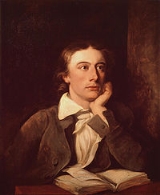
poet. Along with Lord Byron and Percy Bysshe Shelley
, he was one of the key figures in the second generation of the Romantic movement, despite the fact that his work had been in publication for only four years before his death.
Although his poems were not generally well received by critics during his life, his reputation grew after his death to the extent that by the end of the 19th century he had become one of the most beloved of all English poets.
My spirit is too weak — mortalityWeighs heavily on me like unwilling sleep,And each imagin'd pinnacle and steepOf godlike hardship tells me I must dieLike a sick Eagle looking at the sky.![]()
In drear-nighted December,Too happy, happy tree,Thy branches ne'er rememberTheir green felicity.![]()
But were there ever anyWrith'd not of passed joy?The feel of not to feel it,When there is none to heal it,Nor numbed sense to steel it,Was never said in rhyme.![]()
It keeps eternal whisperings aroundDesolate shores, and with its mighty swellGluts twice ten thousand Caverns, till the spellOf Hecate leaves them their old shadowy sound.![]()
Shed no tear! O shed no tear!The flower will bloom another year.Weep no more! O weep no more!Young buds sleep in the root's white core.![]()
This living hand, now warm and capableOf earnest grasping, would, if it were coldAnd in the icy silence of the tomb,So haunt thy days and chill thy dreaming nightsThat thou wouldst wish thine own heart dry of bloodSo in my veins red life might stream again,And thou be conscience-calm'd — see here it is —I hold it towards you.![]()
Bright star! would I were stedfast as thou art-Not in lone splendour hung aloft the nightAnd watching with eternal lids apart,Like nature's patient, sleepless Eremite,The moving waters at their priestlike taskOf pure ablution round earth's human shores.![]()
Here lies one whose name was writ in water.![]()

